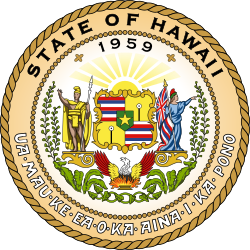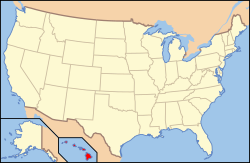| Hawaii Department of Corrections and Rehabilitation Ka ʻOihana Hoʻomalu Kalaima a Hoʻoponopono Ola (Hawaiian) | |
|---|---|
 Seal of Hawaii | |
| Abbreviation | DCR |
| Motto | He Au Hou ("a new era") [1] |
| Agency overview | |
| Formed | January 1, 2024 |
| Preceding agency | |
| Jurisdictional structure | |
| Operations jurisdiction | Hawaii, U.S. |
 | |
| Map of Hawaii Department of Corrections and Rehabilitation's jurisdiction | |
| Size | 10,931 square miles (28,310 km2) |
| Population | 1,455,271 (2020 census) |
| General nature | |
| Operational structure | |
| Headquarters | Honolulu, Hawaii |
| Agency executives | |
| Website | |
| dcr.hawaii.gov | |
The Hawaii Department of Corrections and Rehabilitation (DCR) is a department within the executive branch of the government of the U.S. state of Hawaii. The mission of the Department of Corrections and Rehabilitation is "to provide a secure correctional environment for comprehensive rehabilitative, holistic, and wraparound re-entry services to persons sentenced to our custody and care with professionalism, integrity, respect, and fairness." [6]
